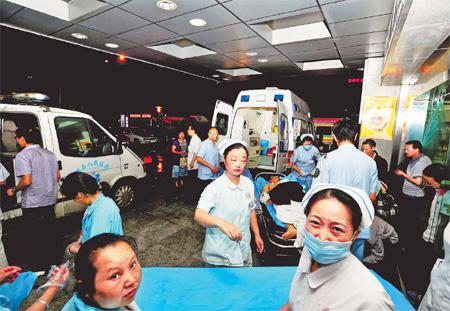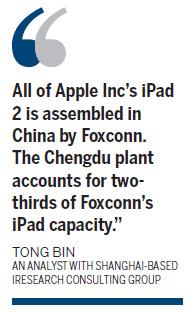
Doctors and nurses receive workers injured in an explosion Friday night at the Foxconn factory in Chengdu where iPad 2s are assembled. Two employees died and 16 were injured. [Photo / Provided to China Daily]
Latest incident again puts company's image under a harsh spotlight, report Gao Changxin in Shanghai, and Hu Yongqi and Tuo Yannan in Beijing.
Two workers died in an explosion at the iPad factory in Chengdu, capital of Sichuan province, on Friday evening. Sixteen others were injured, three seriously. The cause of the explosion was still under investigation late on Sunday.
The blast occurred, according to Xinhua News Agency, at about 7:20 pm in the polishing workshop of a company that is part of Taiwan-based electronic giant Foxconn, one of Apple Inc's most important partners for iPad assembly and parts production.
The factory went into operation seven months ago and is "an important production base for the iPad, Apple Inc's tablet computer", China Central Television (CCTV) reported.
"Apple Inc's iPad 2 is entirely assembled in China by Foxconn. The Chengdu plant accounts for two-thirds of Foxconn's iPad capacity," Tong Bin, an analyst with Shanghai-based iResearch Consulting Group, told China Daily.
The deaths on Friday followed a string of suicides and labor disputes involving Foxconn and its client, Apple. In 2010, 13 Foxconn workers jumped from the company's buildings in Shenzhen. Eleven died. Work safety authorities in March promised increased vigilance at a factory where eight workers were exposed to a chemical used to clean the apple-shaped logo on iPads.
Apple said it is "deeply saddened by the tragedy". By late Sunday, it had not responded to questions about the possible market effect of the Foxconn explosion, whether Apple's image would be tarnished and whether Apple would consider changing manufacturers.
In China, the price of iPad 2s on the "gray market" may rise, analysts said. Apple's Chinese online store says it has sold out of the new tablets. More than 800 customers lined up, many overnight, at the Apple shop in Beijing when the device was launched in China on May 6.
Investigation begun

The 16 injured workers were sent to nearby hospitals, according to Xinhua. The factory, in Pixian county of Chengdu, is owned by Hongfujin Precision Electronics Co Ltd, a subsidiary of Foxconn International Holdings Ltd.
CCTV reported at the site that there was heavy, suffocating smoke, but no fire was visible.
The explosion was loud. Workers and nearby residents heard the noise and felt the shock, the reporter said.
A preliminary police investigation has ruled out the possibility of a crime, while the cause of the accident is under investigation, Xinhua said.
Tai-Ming Gou, chairman and president of Hon Hai, Foxconn's parent, took a flight to Chengdu on Friday, Xinhua reported.
Foxconn spokesman Edmund Ding said on Saturday in an e-mail to the media that fire authorities had completely controlled the accident, and that Foxconn was doing its best to cooperate with the investigation while contacting families of the affected workers.
"Foxconn Chengdu has stopped all production in the factory compound where the explosion happened until a comprehensive investigation is completed," he said.
Foxconn did not respond on Sunday when contacted by China Daily.
Apple Inc said in an e-mailed statement: "We are deeply saddened by the tragedy at Foxconn's plant in Chengdu, and our hearts go out to the victims and their families. We are working closely with Foxconn to understand what caused this terrible event."

Top: Workers evacuate through smoke from a workshop blast at the Foxconn factory. Above: A handful among 177 newly hired Foxconn workers from Guizhou wait at the Guiyang railway station on March 1 before heading to Chengdu.
Expanding north
The factory was built in a very short time. "The Chengdu project took 76 days to go from construction to operation. It's a new record in Foxconn globally," Foxconn's chief investment officer, Zhuang Hongren, said at a ceremony that marked the start of operations at the plant in October, Chengdu Daily reported.
Gou announced in Chengdu on Dec 24 that he planned to expand the plant's annual capacity from 20 million to 40 million iPads this year and to 100 million in 2013.
Foxconn will spend five years on making Chengdu its most important base globally, according to the newspaper.
Foxconn has a huge factory complex in Shenzhen, the coastal city in South China's Guangdong province. Since last year, it has been moving north.
Its new factories in Zhengzhou, capital of Central China's Henan province, began production in August. Its factory in Chengdu started operation in October, and construction of a factory in Tianjin started last month.
A likely hit to sales
The blast in Chengdu may be felt globally.
"The explosion will definitely have an impact on Apple's third quarter performance, given the importance of iPad 2," said Tong, the analyst.
The tablet computer is the most important product for Apple Inc globally this year, he said. Earlier this year, Apple cut prices on first-generation iPads to clear its inventory, paving the way for sales of the iPad 2.
Tong figures the market impact of the explosion will be short-term. "What is uncertain is how long the investigation process will take. It depends on how Foxconn and Apple work with the local government.
"The whole Chengdu plant was built in about two months," he said, "so it will not take long for Foxconn to repair the damaged facility."
An analyst with Canada-based investment bank RBC Dominion Securities Inc foresees poor third-quarter results if "Apple is unable to utilize alternatives or get back on stream by June", especially if the popular iPad 2 is produced in Chengdu.
Mike Abramsky made his comments to Atlanta-based Cable News Network (CNN). He also mentioned that if the halt at the Chengdu factory extends into June, lost production could reach up to 2.8 million units - 36 percent of the output planned for the third quarter.
Under this scenario, Apple's earnings per share could drop by 35 to 55 cents, he said.
At the close of Nasdaq trading on Friday, Apple's stock was down 1.56 percent for the day to 335.22, near its monthly low.
Driven by the prospect of a supply shortage after the explosion, "the gray market price for iPad 2 will definitely go up," said Sun Peilin, an analyst with Beijing-based IT research company Analysys International.
The tablet was highly popular in the irregular but legal market after iPad 2 was introduced in the United States. The price of an iPad 2 was as high as 6,000 yuan ($922.37) for the WiFi 16-gigabyte model. After the product was launched in China, the gray market price dropped to Apple's official price, $499.
Analyst Tong agreed with Sun's forecast.
"The price of iPad 2 in underground sales channels in China will go up, as the already strong consumer demand here in China would be made stronger by supply shock," he said.
Popular in China
China is important for Apple. In the first quarter of this year, revenue from China alone accounted for nearly 10 percent of Apple's total global revenue.
The iPad, both first-generation and second-generation, had about an 80 percent market share in the worldwide tablet personal computer market in the first quarter of 2011, and at least 78 percent in the Chinese market, Sun said.
After the iPad 2 was launched in China, sales of the device surpassed those of all other tablet PCs, including the first-generation iPad.
Despite its popularity in China, iPad sales dipped globally, which Apple acknowledged in April and blamed on supply constraints. Component shortages were expected to get worse following the March 11 earthquake and tsunami in Japan.
"Customer enthusiasm has been tremendous for iPad 2, and we're working as hard as we can to get it into their hands as fast as possible ... We sold every iPad 2 that we could make," Apple's chief financial officer, Peter Oppenheimer, said at the time.
Chen Hong in Shenzhen contributed to this report.





